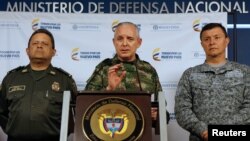Around 1,200 former members of Colombia's FARC rebel group did not demobilize under a peace deal and instead joined dissident factions still fighting the government, the head of the military said on Tuesday, quadrupling the initial official estimate of dissidents.
Most members of the Revolutionary Armed Forces of Colombia (FARC) handed over their weapons at the start of last year and are now a political party, after battling the government for more than five decades.
General Alberto Jose Mejia had estimated in February 2017
that dissident fighters numbered some 300."These dissidents have grown in some parts of the country.
Initially there was a jump from 500 to 750, to 1,000 ... and now the figure is approximately 1,200," Mejia told journalists.
More than 12,200 FARC fighters and sympathizers are participating in reintegration programs. The group handed in more than 8,000 weapons to the United Nations during demobilization and ran candidates in their first-ever elections this month.
FARC dissidents have joined crime gangs and the National Liberation Army (ELN) rebels on the list of the country's top security threats since demobilization, as the different groups fight each other and state security forces for control of lucrative drug trafficking routes and illegal mining areas.
"These residuals are dedicated specifically to drug trafficking, to developing illegal economies," said Mejia, adding extortion was also a funding source for the dissidents.
Two hundred forty-eight FARC dissidents have been captured, killed or have handed themselves into authorities since the offensive against them began about the middle of last year, Mejia said.





